Barnbow Canaries: Telling the stories of WW1 munitions workers
- Published
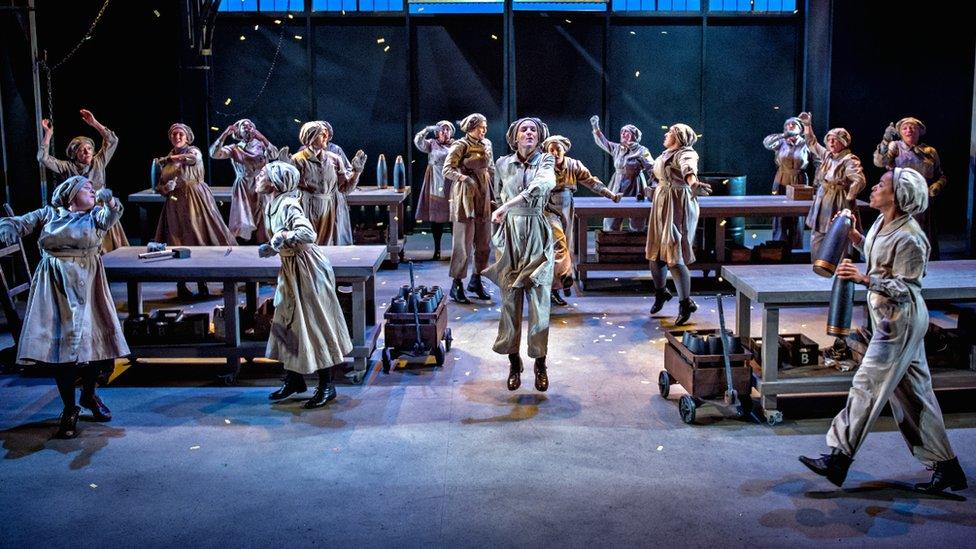
The play tells the story of women who were "almost swept under the carpet" after World War One
In 1916, an explosion in a Leeds munitions factory caused what is claimed to be one of the UK's single largest loss of female life in World War One, yet wartime conditions meant the deaths of 35 women were barely reported. A century on and the story of the devastation and consequences of the blast at Barnbow munitions factory is being revealed in a new play at the city's West Yorkshire Playhouse.
Barnbow Canaries is playwright Alice Nutter's tribute to not just those who lost their lives, but the thousands of others who worked there in dangerous conditions - though she says it is "not a sentimental tribute".
"The thing I'm interested in with these women is that sense of what happened - it was an absolute tragedy but a tragedy is not a drama.
"I realised that the story was bigger than the disaster.
"While it wasn't the first time that women were working, it was the first time they were earning proper money, men's money.
"The women who worked in the Barnbow danger rooms, some of them went from earning two shillings and sixpence in domestic service to three pounds a week. Men didn't earn that. It is really good money.
"They had money to spend on going out and a social life that wasn't controlled by their husbands, brothers or fathers and they did skilled work.
"But rather than this being seen as women being capable and claiming their freedom, it was seen as a blip.
"After the war, women were expected to go back to exactly where they were before - when I realised that, I thought 'I want to write this play'."
'Political perspective'
Nutter was asked to find a drama in the history by the Playhouse's artistic director James Brining, who had lived with the story since hearing it from his grandfather.
He says he decided he wanted to put it on stage while researching local stories, but was far more interested in telling a story of social change, than commemorating a centenary.
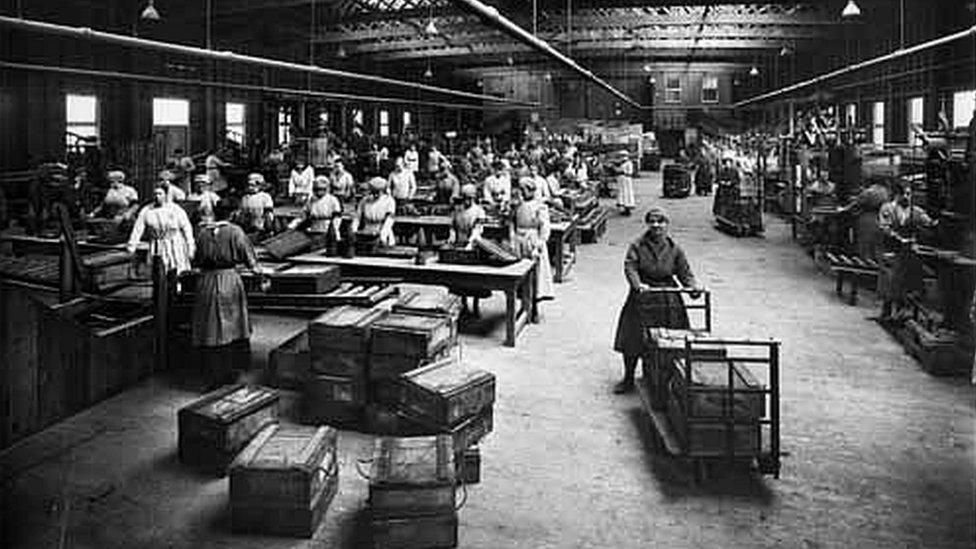
The factory employed more than 15,000 women at the height of production
That desire drove him to ask Nutter to come on board, as he "wanted a woman to tell the story and her mixture of political perspective and interest in social justice made her the obvious choice".
The playwright says she was never tempted to make the play solely a historical piece and drew on her own experiences to find the theatre within it.
"Historical research is not a play and knowing which soap they used is not a drama.
"Once I started writing, I realised this wasn't just a play about the First World War and munitions workers, it was about two sisters and what happens when you lose somebody you love - how they stay with you and shape the things you do.
"I could write about that because my sister died in 2010 - as a dramatist, you do all the research and then you write a drama on the muscle of what you know and what you feel.
"The play has to come from your mind and your heart."
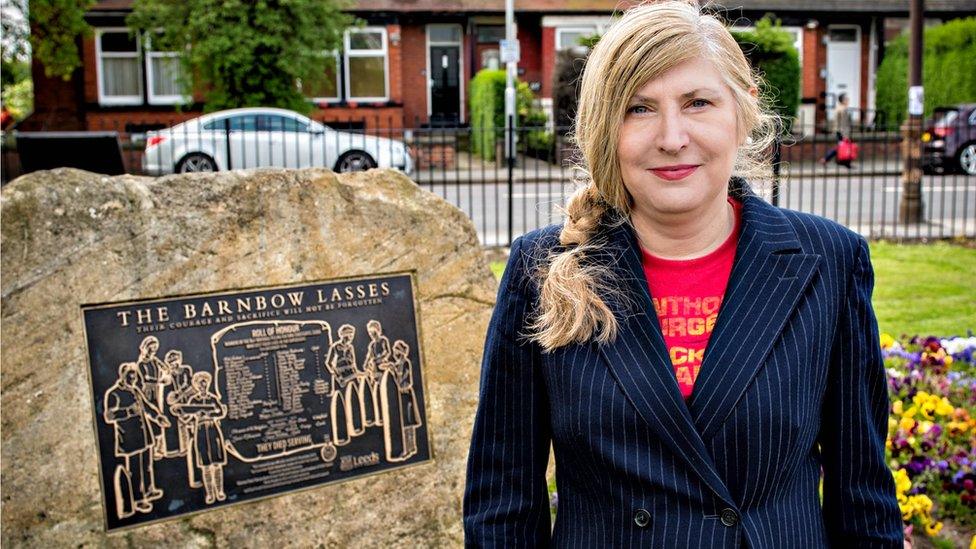
Nutter says she soon realised the story of Barnbow 'was bigger than the disaster'
Researching the disaster saw Nutter speaking to the families of those it impacted upon, including David Wilcox, whose grandmother Eliza and great aunts Lizzie and Annie only escaped the explosion by luck.
After getting jobs at the factory, he says "they met up in Hut 42, where the explosion happened", but crucially, a month before the disaster, "Grandma was upgraded to overlooker and was moved to an adjacent block".
"Lizzie and Annie got a transfer to the same block. On the night of the explosion, they were all on night shift when a huge explosion rocked the factory.
"Annie used to say 'if it weren't for our Li, we wouldn't be here now', but Grandma would never speak about it. The story is that she went in to retrieve people and do what she could."
'Casual sexism'
Nutter says the women who worked in the factory were "soldiers, because they worked in really dangerous conditions".
"All munitions workers knew they were being poisoned.
"Not that they'd been told, but once you got the symptoms - turning bright yellow with stomach, eye and throat problems - you're not stupid, you know it's because you're working with bright yellow powder.
"But they accepted it in the same way that men at the front accepted the dangers - partly because they were being paid well, but also because they thought it was their patriotic duty.
"Yet after the war, they weren't treated like soldiers. When the men came back, women were expected to relinquish their jobs.
"There was a real return to the status quo and women believed they would be seen as selfish if they acted against it."

Barnbow and the Canaries
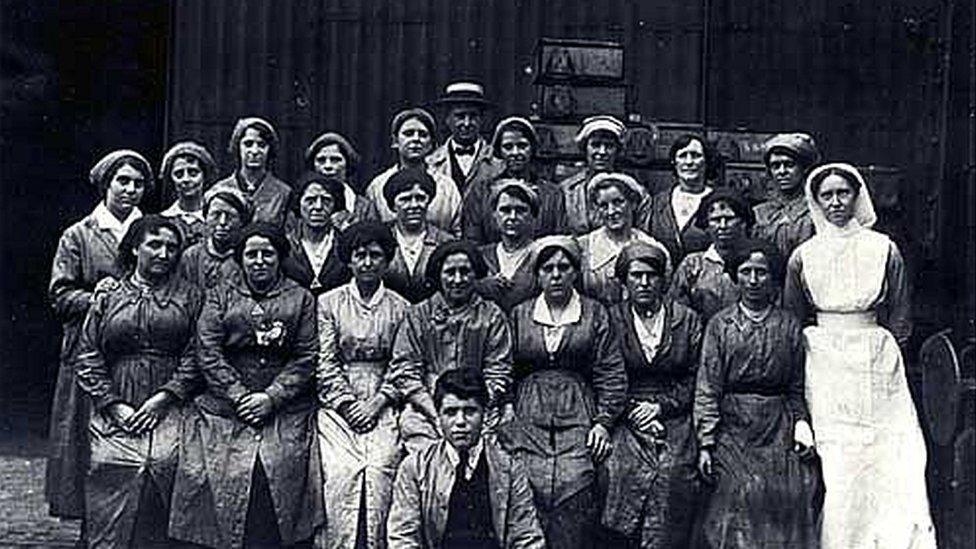
Built in 1915, at its height, the 400 acre (160 hectare) Barnbow munitions factory employed almost 17,000 workers (130,000 applied for jobs), 93% of which were female
The chemicals used turned the skin of workers yellow, earning them the "Canaries" nickname
The explosion in Hut 42 on 5 December 1915 killed 35 workers and injured many others - as it was wartime, it went unreported, with the women listed in death notices as being "killed by accident"
Subsequent explosions in March 1917 and May 1918 killed two further women and three men
The site was closed following the 1918 Armistice, having produced almost 47,000,000 shells - the last remaining buildings were demolished in 1933
Find out more: WW1 at Home - The Factory Disaster that Killed 35 Women

The production features a community chorus alongside its professional cast - 17-year-old Anna Keat lives in Cross Gates, a stone's throw from where the disaster happened.
She says the play has given her "an insight into the women that worked there".
"There are scenes where we're doing the jobs that they would have done and it amazes you how hard they would have worked.
"It does scare me, because it could have been me and probably would have been me."
She says it is an important story to tell "because it was so hidden by the government".
"After the war, they wanted to keep it on the down-low because they wanted women to go back to their houses and work there, so nobody got to know the real story about what happened."
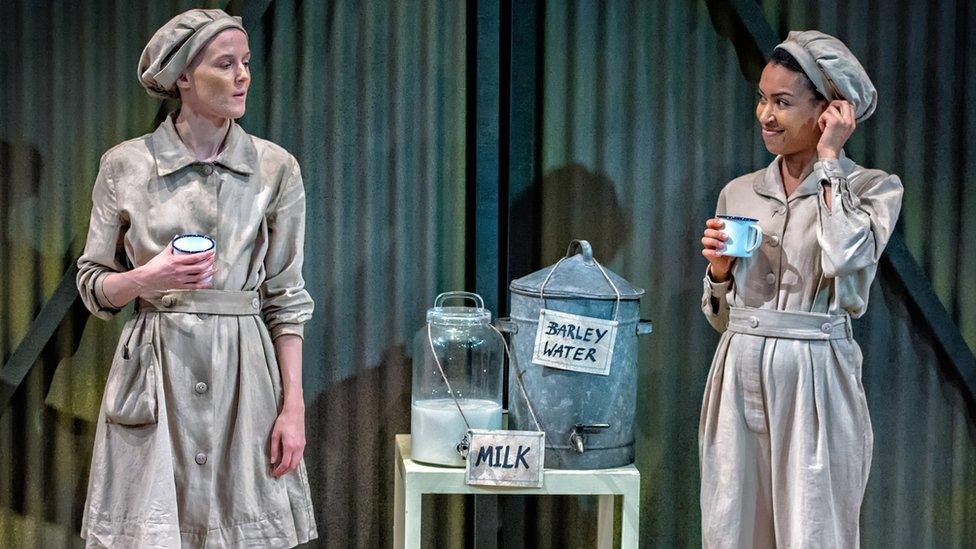
Wilcox says the play 'shows is that everybody was important, whoever they were'
Nutter says that was something that drove her to want to tell the story, as despite living in Leeds since 1982, she had "never heard" of Barnbow.
"I don't think it was any sort of conspiracy. I think it's more casual sexism - soldiers were commemorated but women were almost swept under the carpet.
"When the explosion happened, I can fully understand why they couldn't publicise it, because they didn't want the Germans to know where the factory was - zeppelins were flying over, it's absolutely understandable.
"After the war, that didn't apply any more, but I genuinely think that the male status quo didn't think women's lives were that important.
"It had happened and it wasn't news. It wasn't a conspiracy, it just wasn't deemed as something they needed to commemorate."
Wilcox agrees, saying that women "were always put on the back burner, they never got praise for anything".
"This showed that women could do the work of men, but they were never recognised as such.
"What this play shows is that everybody was important, whoever they were."
Barnbow Canaries is at West Yorkshire Playhouse in Leeds until 9 July.